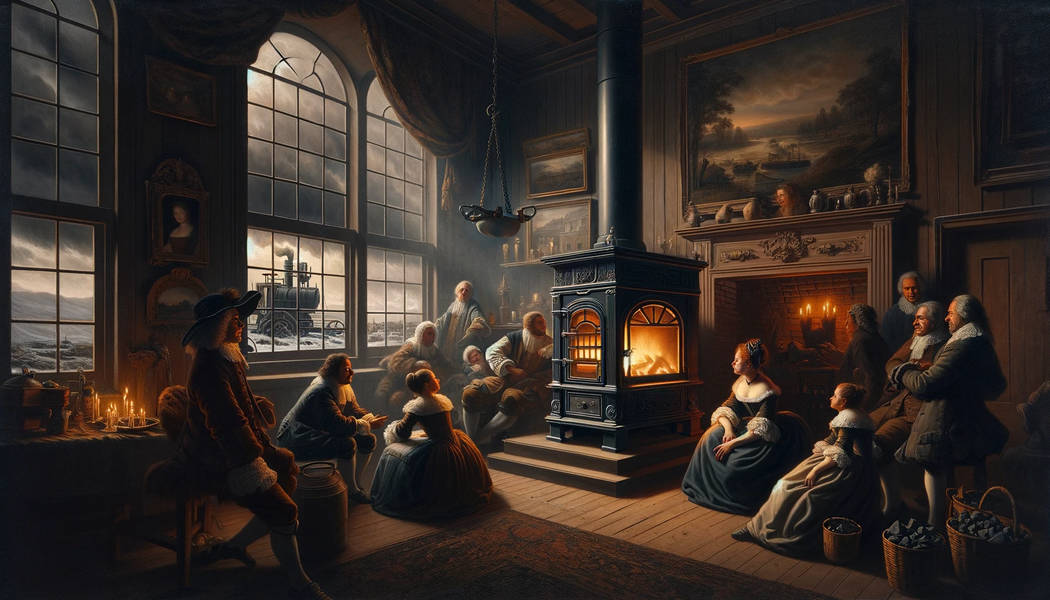Little Links & Notes 5
‘When Coal First Arrived, Americans Said ‘No Thanks’’ (Smithsonian;°
But convincing Americans to use the new fuel proved tricky… Many people hated the aesthetics of stoves because they were enclosed, and you couldn’t see the flames within as you could in a traditional fireplace. In articles and speeches, prominent citizens protested, denouncing stoves as, essentially, un-American… The cultural arguments piled up. Food cooked in stoves was baked, not broiled, and that, too, offended American tastes… “People were blaming coal-fired stoves for impaired vision, impaired nerves, baldness and tooth decay,” says Barbara Freese, author of Coal: A Human History.
‘All History is Revisionist History’ (Humanities Magazine / James M. Banner Jr.°)
This article is a tad lifeless and an editor really needed to cut down its length. But, it’s still likely worth your time.
Don’t have the time? Here’s the summary:
Distinct from “the past” are the narratives and analyses that historians offer about earlier times. That’s what we call “history.” History is what people make of the forever-gone past out of surviving documents and artifacts, human recall, and such items as photographs, films, and sound recordings. And because each historian is an individual human being… they come to hold different views, have different purposes, create different interpretations, and put forth their own distinctive understandings of “the past.”
[…] Many people find it difficult to accept such frequent challenges to what they were taught to think of as unalterably fixed and true. It’s not surprising that they ask in bewilderment: If the past can’t change, then how can the history about it do so? They’re offended to learn that at least some of what they were taught early in life as “history” is no longer fully accepted by historians and is instead taught in different ways… Many people are ready to dismiss all such interpretations as no more than “revisionist history”—the result of ideology, politics, and misbegotten negativism.
[…] All written history is revisionist in intent or consequence. Revisionist history is a universal phenomenon. Historians’ debates and shifting views of their subjects are the principal means by which they approach, while never reaching, their goal of understanding the extraordinary complexity of human life in times before their own.
[…] In no case does a new way of viewing the past annihilate older ones. On the contrary: Discarded historical interpretations, like strata of ancient sedimentary rock, lie buried atop each other, out of sight until they’re made visible again for study and use. Renewed, reconsidered, and repurposed, they can then fuel fresh struggles to understand the past. Revisionist history ensures the unending renewal of knowledge of what came before our own days on earth. We should celebrate as well as accept that fact.
Michael Sugrue on Marcus Aurelius and stoicism (YouTube, here’s a audio-only copy). This 42 minute lecture is probably my favourite, simple explanation of stoicism. I do disagree with one or two of his points, but overall this is a great introduction to stoic philosophy and Marcus Aurelius. Worth a watch.
And here’s an article° on Michel Sugrue and how after he uploaded his old lectures from the 1990’s to YouTube he ‘became a phenomenon’ (bit of a stretch there, but still).
When I come across a word I don’t know whilst reading I will immediately search for its meaning, jot it down in WorkFlowy, then later add it into Anki (my spaced repetition software of choice) with the hope that I will learn it.
However I’ve slowed down a little on this recently. I just spend too much time and brain power learning words which the Oxford Dictionary label as ‘archaic°’. Basically words not really used any more.
My new strategy is only to learn new words that I’ve already come across quite a few times or that are particularly good words.
Though if I stumble upon a word that I don’t know in a popular magazine or online article I will nearly always learn it. Because if it’s featured in a place like that it’s probably a fairly common word and worth learning.
Last night I saw an advert for a TV show called Let’s Game° that’s made by Sky, a traditional cable provider. It’s essentially a ‘let’s play’ gaming YouTube channel, only it’s on TV (or available to stream).
Sky have obviously realised this is what the kids want and watch these days (though I’m sure quite a few executives took some convincing. “It’s a show where you watch people play video games?!”) and have decided to offer them a more polished version of a ’let’s play’ hoping to entice a younger audience to their services.
The show is aired on the Sky Kids channel, so is aimed to a very young audience, with their parents being the ones actually paying the bill. But I’m sure most young kids don’t use Sky or even know what it is these days. When they want to watch something they go straight to YouTube or Netflix, even if their household has Sky. Sky knows this, and I’d imagine with this show they’re just hoping that kids might actually become aware of their existence and get used to their (awful, expensive) ecosystem in the hope that when the kid grows up they’ll maybe consider a Sky subscription.
Read this next: Dwight Schrute Is My Life Coach
